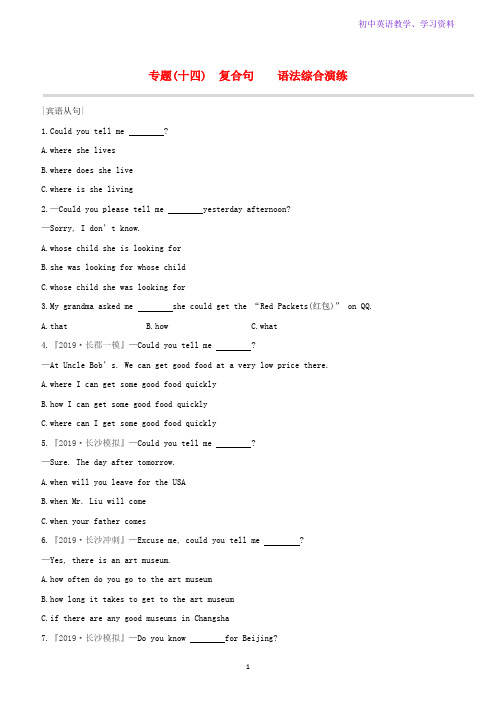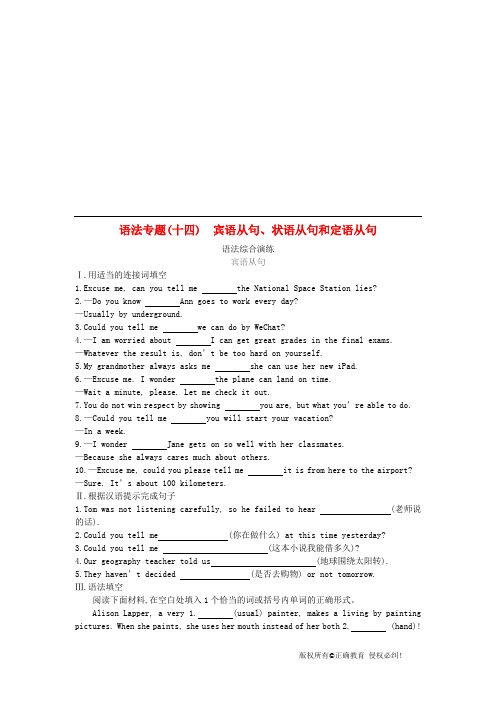(广东地区)201x年中考英语复习 专题十四 简单句
- 格式:ppt
- 大小:1.02 MB
- 文档页数:98


专题十四阅读理解(主旨大意题)阅读理解题型分类主旨大意题的考查,要求学生通过阅读文章,抓住文章的主旨大意所在,在理解文章内容的基础上,找到文章大意或段落大意,主要考查学生归纳概括信息的能力。
主旨大意题主要考查考生把握全文主题和理解中心思想的能力。
通常以选择文章最佳标题(title/topic),概括文章中心大意(main idea)、文章段落大意(topic)等形式出现。
主旨大意题是考生容易出错的题型之一,错误主要表现为:概括文章中心时以偏概全(只见树木不见森林),概括性不够,或者概括过度,超出了文本的内容,缺乏针对性。
一、主旨大意题的分类主旨大意题的分类及其常见设问形式1. 标题概括类做此类试题时,要注意标题的三个特性,即醒目性、概括性和针对性。
解题时要抓住文章的首尾段和每一段的首尾句,要注意贯穿文章始终的词语。
常见设问形式有:What is the best title for this passage?Which of the following is the best title of the passage?What can be a suitable title for the text?What might be the best title for the passage?The best title of the passage is ______.The suitable headline of the passage may be ______.2. 文章大意类每篇文章都有中心思想,可以通过找主题句来获取文章中心思想。
主题句通常在首段或结尾段,但有时也会出现在文章的中间段落。
因此,在阅读时要倍加关注文章的首段和结尾段及各个段落的主题句。
常见设问形式有:What is the main idea of the passage?Which of the following can best summarize the passage?What is the message conveyed in the story?What does the passage mainly present?What is the main theme of the story?What does the story mainly tell us?What does the passage mainly talk about?The passage is mainly about ______.The main purpo se of the passage is to ______.The passage is mainly written to ______.3. 段落大意类每个段落通常都有一个中心思想,通常会在本段首句体现出来,即常说的段落主题句。


专题(十四) 复合句语法综合演练|宾语从句|1.Could you tell me ?A.where she livesB.where does she liveC.where is she living2.—Could you please tell me yesterday afternoon?—Sorry, I don’t know.A.whose child she is looking forB.she was looking for whose childC.whose child she was looking for3.My grandma asked me she could get the “Red Packets(红包)” on QQ.A.thatB.howC.what4.『2019·长郡一模』—Could you tell me ?—At Uncle Bob’s. We can get good food at a very low price there.A.where I can get some good food quicklyB.how I can get some good food quicklyC.where can I get some good food quickly5.『2019·长沙模拟』—Could you tell me ?—Sure. The day after tomorrow.A.when will you leave for the USAB.when Mr. Liu will comeC.when your father comes6.『2019·长沙冲刺』—Excuse me, could you tell me ?—Yes, there is an art museum.A.how often do you go to the art museumB.how long it takes to get to the art museumC.if there are any good museums in Changsha7.『2019·长沙模拟』—Do you know for Beijing?—Last Friday evening.A.when she leavesB.when she leftC.when will she leave8.『2019·常州改编』—Could you tell me the music?—He used traditional Chinese music and the sounds of an ancient Chinese bell.A.how he madeB.how did he makeC.why he made9.『2019·咸宁改编』—I am worried about I can enter a good high school or not. —Take it easy. Believe in yourself!A.thatB.whenC.whether10.『2019·天津改编』—Could you tell me for the fruit?—By paying over the Internet.A.how much will I payB.how I will payC.how will I pay11.『2019·滨州改编』—Could you tell me ?—Sure. Go down the street, and you can find it at the second crossing!A.where is the supermarketB.where the supermarket isC.when does the supermarket open12.『2019·宿迁』—What did Mr. Wang ask you just now?—He asked me yesterday afternoon.A.why I am absent from schoolB.why I was absent from schoolC.why am I absent from school13.『2019·青海』—What did you learn in geography class yesterday?—I learned that the sun in the east.A.was risingB.risesC.rose14.—Do you know at this time yesterday?—Sorry, I don’t know.A.what she is doingB.what was she doingC.what she was doing15.Do you know ?A.when will he be backB.when he will be backC.where did he go16.『2019·广东』—Have you decided the Expo 2019 Beijing?—This summer holiday.A.how are you going toB.when you are going toC.when are you going to17.『2019·山西』—Some schools have used smart uniforms. I wonder .—They can tell parents where their children are.A.who invented themB.what they are used forC.when students wear them18.『2019·百色改编』—I want to know we will have the meeting.—Maybe in the classroom.A.whereB.whenC.whether19.『2019·眉山改编』—What did Tom say to you just now, John?—He asked .A.what I am so happy todayB.what will I do for the weekendC.if I could go to the movies with him tonight20.『2019·桂林』Do you know the students like the mobile phone game so much?A.whatB.whyC.how|状语从句|1.『2019·长沙模拟』—WeChat is attractive an invention many people are crazy about it.—Every coin has two sides. We need to use it wisely.A.so; whichB.so; thatC.such; that2.『2019·长沙模拟』You can do well you stick to your dream and keep learning.A.everything; unlessB.nothing; unlessC.nothing; if3.『2019·贵阳』Our eyesight will become poorer and poorer we keep playing with phones.A.thoughB.unlessC.if4.—What was your brother doing at this time yesterday?—He was reading a magazine I was writing an e-mail.A.afterB.as soon asC.while5.—It is said that Wang Yuan gave a wonderful speech in English at the United Nations for the public service.—That’s true.He worked hard his spoken English has improved a lot.A.as ifB.so thatC.since6.—Would you like to go for a walk with me, Molly?—I’d love to, you don’t want to go alone.A.untilB.beforeC.if7.『2019·贵港改编』—Has the meeting begun yet?—Not yet. We have to wait everyone is here.A.andB.untilC.or8.『2019·本溪改编』—Lingling, you’ll feel sleepy tomorrow you go to bed early. —OK, Mom. I’ll go to bed at once.A.ifB.unlessC.though9.—There is always a smile on your face.Isn’t there any trouble in your life?—Yes, there is.But life is like a mirror. you smile at it, it will smile back.A.WhenB.BeforeC.Until10.『2019·盘锦改编』The old man leads a simple life, he has a lot of wealth.A.althoughB.soC.unless11.『2019·东营改编』—I’m afraid e-books might be bad for our eyes.—Hmm, but they will be helpful for us we put them to good use.A.as soon asB.as long asC.even though12.Bob, dinner is ready.Please wash your hands you eat.A.untilB.afterC.before13.We don’t know the love of our parents we become parents ourselves one day.A.untilB.afterC.when14. As students, full use we have made of our time to study, there’s still room for improvement.A.whicheverB.whateverC.though15.『2019·包头改编』It was the middle of the night the sound of the piano woke me up.A.becauseB.ifC.when16.—Will you please give this message to Helen?—Sure.I’ll give it to her she arrives here.A.untilB.althoughC.as soon as17.The book was written in easy English even primary school students could understand it.A.so; thatB.such; thatC.too; to18.『2019·东营改编』—Remember to keep the dog on a leash(狗链) you walk it, honey! —Sure. I won’t let it hurt others.A.untilB.afterC.while19.They develop their skills they can do things better and better.A.becauseB.sinceC.so that20.We didn’t enjoy the day the weather was so bad.A.becauseB.thoughC.unless|定语从句|1.—Do you like the hero in the book fights for freedom all the time?—Yes, of course.I think he is great.A.whichB.whatC.who2.—What kind of music do you prefer?—I prefer the music has beautiful lyrics.A.whichB.whoC.what3.Being blind is something most people can’t imagine.A.whoB.whatC.that4.『2019·长沙模拟』I can’t forget the days I spent with you in Hainan last year.A.whichB.whenC.what5.『2019·长沙模拟』—What are you looking for?—I’m looking for the book you bought last Sunday.A.whoB.whenC.that6.『2019·长沙模拟』—More and more people take their parents to go on vacation now!—That’s good. We need to love and take good care of those love us.A.whoB.whatC.which7.『2019·长沙』China is getting better at making hi-tech products can be bought in all parts of the world.A.whoB.whichC.what8.『2019·哈尔滨』—Have you got ready for the soccer game?—Yes, I’ve done everythi ng I can to win the game.A.whoB.thatC.which9.『2019·铜仁改编』—What are you doing?—We are talking about the books and writers we like.A.thatB.whichC.who10.『2019·鄂州改编』—Do you like the weekly talk show The Readers on CCTV?—Sure. It’s a great TV program can develop the habit of reading.A.whoB.thatC.what11.『2019·天水改编』—Have you seen the film The Wandering Earth(《流浪地球》)?—Yes. It’s the best one I have ever seen.A.thatB.whichC.what12.The Reader is a great TV program purpose is to bring the habit of reading back into the public.A.whichB.thatC.whose13.He is a person is easy to get along with.A.whomB.whichC.who14.Every one of us was surprised at the photos were taken by Mr.Brown in the deep sea.A.whoB./C.which15.We all like those volunteers always help the people in trouble.A.whoB.whichC.whose——★参*考*答*案★——宾语从句1.A2.C3.B4.A5.B6.C7.B8.A 考查宾语从句。

专题十四简单句(陈述句,感叹句,疑问句,祈使句)一.陈述句陈述句用来陈述一句事或表达一种看法,有肯定和否定两种形式,句末通常用句号,读降调。
一.陈述句的肯定形式结构:主语+谓语+其他。
如:That boy often helps others. 那个男孩经常帮助别人。
I went to the cinema yesterday. 昨天我去看电影了。
二.陈述句的否定形式1.be的否定式(1)be用作系动词时,结构为:主语+be+not+表语+其他。
如:She is not a teacher. 她不是一个老师。
(2)be用作助动词,用于be doing/be going to/be done等时态或被动语态中,结构为:主语+be+not+动词的现在分词或过去分词+其他。
如:Jim isn’t playing football. 吉姆不在踢足球。
The sweater isn’t made of wool. 这件毛衣不是羊毛做的。
2.助动词,情态动词的否定式Man can’t live without water. 没有水人类不能生存。
3.除not外,其他否定词也可以构成否定句(1)用no表示,no=not any/a。
如:He has no sisters.=He doesn’t have any sisters. 他没有姐妹。
(2)never绝不,从来不。
如:I have never seen such a man. 我从没见过这样的人。
(3)little, few 几乎没有。
如:There are few students in the classroom.教室里几乎没有学生。
(4)no one/nobody 没有人。
如:No one/Nobody is interested in the book.没有人对这本书感兴趣。
(5)Nothing什么也没有。
如:There is nothing wrong with you. 你没有什么问题。

语法专题(十四) 宾语从句、状语从句和定语从句语法综合演练宾语从句Ⅰ.用适当的连接词填空1.Excuse me, can you tell me the National Space Station lies?2.—Do you know Ann goes to work every day?—Usually by underground.3.Could you tell me we can do by WeChat?4.—I am worried about I can get great grades in the final exams. —Whatever the result is, don’t be too hard on yourself.5.My grandmother always asks me she can use her new iPad.6.—Excuse me. I wonder the plane can land on time.—Wait a minute, please. Let me check it out.7.You do not win respect by showing you are, but what you’re able to do.8.—Could you tell me you will start your vacation?—In a week.9.—I wonder Jane gets on so well with her classmates.—Because she always cares much about others.10.—Excuse me, could you please tell me it is from here to the airport? —Sure. It’s about 100 kilometers.Ⅱ.根据汉语提示完成句子1.Tom was not listening carefully, so he failed to hear (老师说的话).2.Could you tell me (你在做什么) at this time yesterday?3.Could you tell me (这本小说我能借多久)?4.Our geography teacher told us (地球围绕太阳转).5.They haven’t decided (是否去购物) or not tomorrow.Ⅲ.语法填空阅读下面材料,在空白处填入1个恰当的词或括号内单词的正确形式。
句子种类及简单句1.(2020·贵州黔西南中考)Jack, you're going to the mountain village to help the children, ________?A.don't you B.do you C.aren't you D.are you2.(2020·四川乐山中考)—________ does the London Eye take you above the River Thames?—One hundred and thirty-five metres.A.How long B.How high C.How heavy3.(2020·四川乐山中考)—________ terrible mess you have made!—Sorry, Mum. I will clear it up right now.A.What a B.What C.How4.(2020·江苏连云港中考)—________ is Ricky like?—He's humorous. He often tells us funny jokes.A.How B.What C.Which D.Who5.(2020·贵州铜仁中考)—Are there any notebooks on COVID-19(新冠肺炎) in your school?—________. They tell us how to protect ourselves in this big event.A.Yes, they are B.Yes, there are C.Yes, there is D.Yes, it is6.(2020·贵州黔南中考)—Mike, ________ will the new science museum be built?—It will be built in the centre of the city.A.when B.where C.what D.why7.(2020·福建中考)—________ is it since the Communist Party of China(中国共产党) was founded?—Ninety-nine years. It's her 100th birthday next year.A.How often B.How long C.How soon8.(2020·甘肃天水中考)—________ the population of Tianshui?—It's about 3.6 million.A.How many B.How much C.What is D.Which is 9.(2020·江苏淮安中考)—Dina, a theme park will be built in our city next month.—________ good news!A.What a B.How a C.What D. How10.(2020·广西柳州中考)Not only Sam but also his parents________ coming to China soon.A.is B.are C.were11.(2020·四川凉山中考)When I want to go out to play with my friends, my mo ther always says, “________ athome. Don't waste your time.”A.Stay B.Stays C.To stay D.Staying 12.(2020·湖南怀化中考)—________ do you usually exercise?—I usually exercise every morning.A.How far B.How long C.How often13.(2020·湖北恩施中考)There ________ only a few things in the room, like a bed, some chairs and an old desk. A.was B.were C.is14.(2020·青海中考)—We'd better ask the local people when we'll get to the next town.—We did. But nobody could say ________ it would take.A.how often B.how far C.how long15.(2020·四川遂宁中考)Tom hardly eats breakfast, ________?A.isn't he B.is he C.doesn't he D.does he 16.(2020·湖北宜昌中考)—________ did the rules about keeping civilized dogs(文明养狗) come out in Yichang? —I'm not sure about the exact date but I totally agree.A.Why B.When C.Who D.What17.(2020·湖北鄂州中考)Because of the special situation this year, about ________ of the students in our school ________ having classes on the Internet at home.A.two thirds; are B.two third; is C.second thirds; are D.two thirds; is 18.(2020·辽宁抚顺、本溪、辽阳中考)—Dad, ________ will my mum come back? I miss her very much.—In a month.A.how soon B.how often C.how long D.how far 19.(2020·江苏南京中考)Jenny just wondered ________ Angela already knew about the event.A.how soon B.how many C.how often D.how much 20.(2020·云南省卷中考)—________?—It's July 27th.A.What day is it today B.What's the date todayC.What's it like D.What's the time21.(2020·四川达州中考)—________ is your school from your home, Gina?—Only ten minutes' walk.A.How long B.How far C.How many D.How soon 22.(2020·辽宁营口中考)—________ the dishes after dinner, Tony.—No problem, Mum.A.Washing B.Washes C.To wash D.Wash23.(2020·黑龙江大庆中考)On the left of the playground ________ the library. There ________ many books and computers in it.A.are; is B.is; are C.are; are D.is; is24.(2020·江苏淮安中考)—Mike, ________ do you have a health examination?—Once a year.A.how long B.how many C.how much D.how often 25.(2020·湖南邵阳中考)—How can I avoid the illness, Sir?—________ a mask when going out and wash hands with soap.A.Wears B.Wear C.To wear26.(2020·黑龙江龙东地区中考)There ________ still some milk and fruit in the fridge. What else shall we buy? A.is B.isn't C.are参考答案1~5 CBABB6~10 BBCCB11~15 ACBCD16~20 BAADB21~25 BDBDB26.A。
2024中考总复习14:英语基本句型(陈述句、疑问句、祈使句、感叹句)和巩固练习【语法要点】1.陈述句陈述句用来陈述事实或看法,一般用降调,句末用句号。
陈述句包括肯定句和否定句。
1.肯定句肯定句的基本结构为“主语+谓语动词”或“主语+系动词+表语”。
如:My brother is a bus driver.2.否定句(1)如果句子中含有be动词、助动词或情态动词,在这些动词之后加上not构成否定形式。
如:The girl isn’t studying in the classroom.(2)如果句子的谓语动词是实义动词,其否定形式为:助动词do/does/did + not + 动词原形。
如:Mike doesn’t have a brother.(3)除了not以外,还有一些可以构成否定句的否定词,如:no (= bot any / not a), no one, never, nothing,nobody, neither, none等。
如:I have never been abroad.(4)句子中含有little, few, seldom, hardly时,表示部分否定。
如:I can hardly sing English songs.(5)当all, both, each, everyone, everything, everywhere, always等表示总括意义的词和not连用时,表示部分否定。
如:Not all the girls like bright colors.1.一般疑问句1)一般疑问句的结构为“Be + 主语+ 其他?”或“助动词+ 主语+ 谓语动词+ 其他?”读时用升调。
2)对一般疑问句作肯定回答时,通常用“Yes, 主语+ 肯定谓语.”;作否定回答时,通常用“No, 主语+ 否定谓语.”。
3)一般疑问句注意事项:(1)使用一般疑问句时,应特别注意问句与答语在人称、数和时态上的一致;(2)一般疑问句通常用缩略回答。